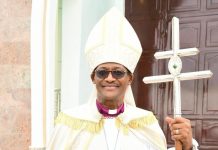Ten-year old Jack was born on Christmas Day. Born in a long family tradition, of many generations, that had no God, no religion, no church, no worship on the family menu.
But for Jack, things were about to change. He was invited on his tenth birthday to go to church by Anna – an eighty-two-year old widow – who had baby-sat Jack since he was six months old. And the parents agreed.
Jack found the music in the church and the story-telling in the children’s church riveting. He was excited and was concerned he may not find the right words to tell his parents how exciting the whole experience was.
Back at home both parents simultaneously asked, “How was it? Boring and full of fake-news?”
‘No’, replied Jack, ‘You had better sit down. I am about to tell you the most amazing story I have ever heard. How God sent his only Son to a childless teenage couple who run from their home village that had expelled them.
Their names were Mary and Joseph.
Thankfully, the shepherds took pity on them and sheltered them in a stable. That night God sent his baby son to cheer them up, carried in an all-gold heavenly ship.
On board the biggest choir beyond human understanding.
As the heavenly ship approached where Mary and Joseph and the shepherds were, the Daleks and Zygons assembled to destroy everyone who was on board.
The Time Lord, Dr Who, seeing the danger used her Sonic-Screwdriver to set the clock, time, back to the Daleks and Zygons pre-existence state.
Phew, they were gone.
The heavenly ship landed. God’s baby son was handed over to Joseph and Mary. The shepherds were thanked for being so kind. And the choir gave the biggest gig on earth but to just a few shepherds.
Dad and Mum, I need to go back next Sunday to find out more and I will come back and tell you’.
The dad said, “I vaguely remember the story. But I don’t think it happened that way.”
‘I know dad’, said Jack. If I told you how it really happened, you would not believe it’.
‘Dad’, said Jack, ‘I believe what the story-teller told us in the children’s church. That the birth of Jesus, the Son of God, in a stable unites heavenly glory and earthly poverty. Therefore, let no one ever dare to despise the poor and the needy, since the Son of God was born in a stable, and cradled in a sheep’s feeding and drinking trough.
Let us beware of despising the poor, because of their poverty. Their condition is one which the Son of God has made holy and honoured, by taking it voluntarily on himself. God is no respector of persons. He looks at the heart of everyone, and not at their incomes.
To be godless and covetous is disgraceful, but it is no disgrace to be poor. It is simply awesome. How the King of kings and Lord of Lords stoops so low, and how gloriously he uplifts the lowly to share his glory. See how the proclamation of Jesus’ birth is to a bunch of common shepherds. The coming of Jesus turns all expectations of who is important and their status upside down. Shepherds becoming the messengers of “good news of great joy for all the people”.
And today, Jesus Christ is still found in the simple, lowly guise, “wrapped in strips of cloths, lying in a sheep’s drinking and feeding trough (a manger)”.
Please let us see the simplicity and the poverty into which the Christ child came. And learn from Him, the joy, simplicity and compassion of His Holy Gospel. Lord, please make us so.’
‘Secondly,’ Jack said, ‘the story-teller said the purpose of the birth of the Christ child was to free everyone and renew their lives as well as their commitment to God and to each other. His birth, as light shining in the darkness, does not leave the everyday world unchanged. Very similar to the game-changer a new born baby brings to their new home. Parents can’t go on as they are. New birth brings real change!
And so encountering Jesus raises our levels of expectation and makes the impossible possible.
For the birth of a Saviour for all people turns them from disobedience to God to child-like obedience. Turns them from despair to hope. Turns them from fear to love. Turns them from guilt to forgiveness. Turns them from estrangement to friendship. And the result is this: Like the shepherds we too must “go in haste to Christ the Lord” who is standing at the doors of our hearts beckoning us to let him come in. We then “glorify and praise God” for the gift of new life in Jesus Christ’.
‘Thirdly’, Jack said, ‘the story-teller said that the song of the multitude of angels, who sang to the shepherds at the birth of Jesus, sang a song of hope for people who lived in dark times’.
Friends, even in uncertain times – like Brexit for us all – the hope is still there, the belief that into darkness God can still shine a light (this is so true in Isaiah 9).
And to many places of oppression, injustices and brutality – very much like the first Christmas when “in and around Bethlehem children who were two years old or under were killed by the order of king Herod” (Matthew 2:16).
And for all of us here at York Minster this morning? What is our response? Are we like Jack or his parents or the Daleks and the Zygons or King Herod?
Let us treasure with the Virgin Mary the wonder of the Birth of the Christ child and ponder it in our hearts.
Let us celebrate with the Shepherds the joy of the Birth of the Christ child and go and spread the good news of salvation to everyone.
Let us sing with the multitude of angels, “Glory to God in the highest heaven, and peace, good will among people”.
Let us with the wise men seek the Christ Child, worship him and offer him our greatest treasure: our total-self.
As the choir now sings, the 4th stanza of Christina Rossetti’s “In the Bleak mid-winter frost wind made moan” (1830-94), let us make it our own response.
‘What can I give him,
Poor as I am?
If I were a shepherd
I would bring a lamb;
If I were a wise man
I would do my part,
Yet what I can I give him;
Give my heart.’
The Most Rev. John Sentamu










